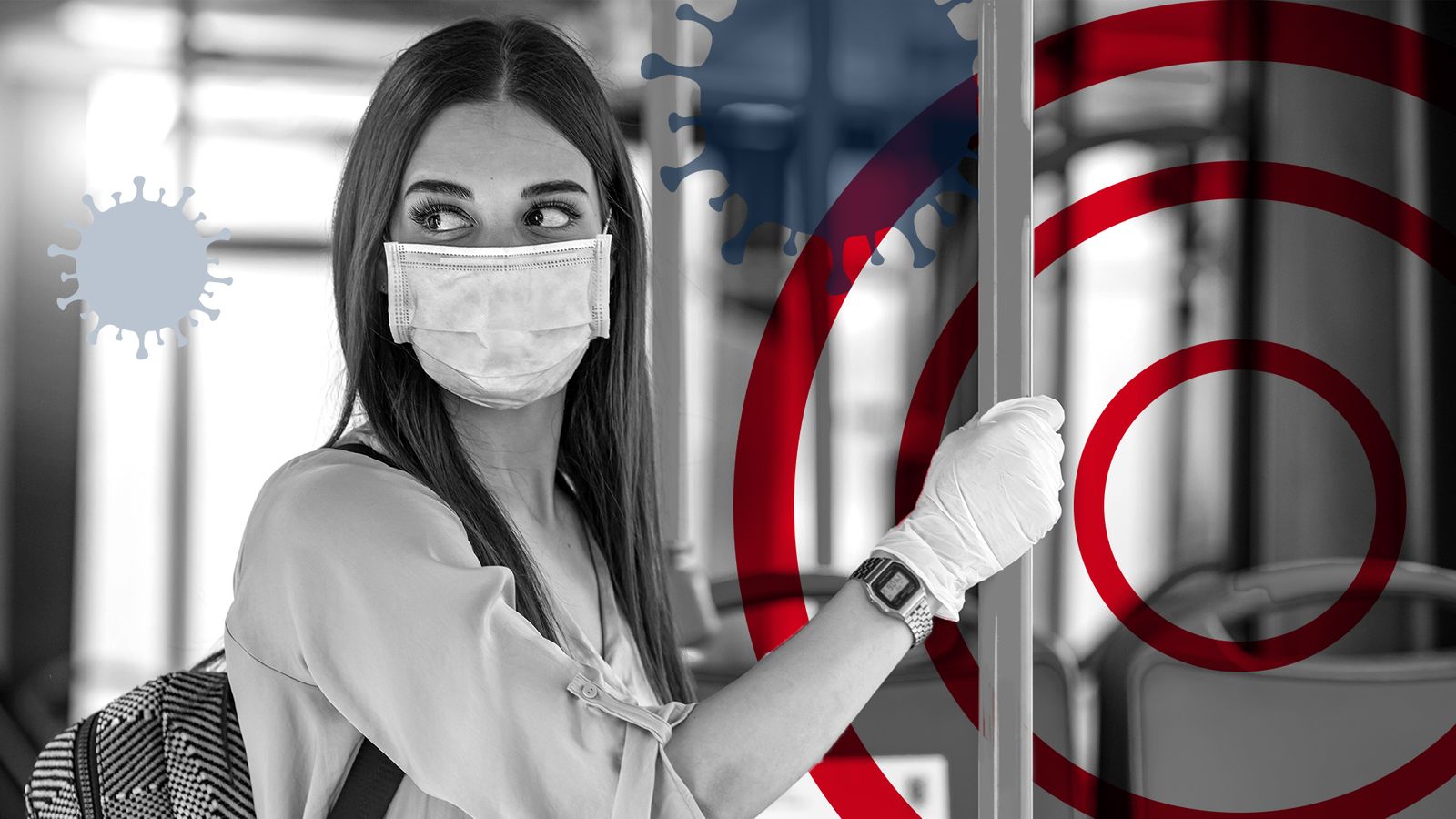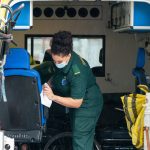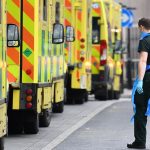People using public transport in England beyond 19 July should still be ready to wear a face mask despite the ending of its legal requirement as part of the government’s roadmap for easing COVID-19 restrictions.
Next Monday will see the relaxation in safety measures, but users of public transport are still being urged to wear masks amid ongoing concern about the spread of COVID-19 – while London passengers will face action if they fail to comply.
Live COVID updates from the UK and around the world
So where will travellers still need to wear a face mask?
Passengers on all Transport for London (TfL) services – including the Tube, bus, tram Docklands Light Railway, Overground and TfL Rail – will need to keep wearing a face covering in stations and for their entire journey unless they are exempt.
Enforcement officers in London will be able to deny access or eject passengers who are found to not be complying with the mask requirement.
TfL will also be tasked with ensuring that mask-wearing among drivers and passengers continues in taxis and private hire vehicles, unless someone is exempt.
The measures in London come after mayor Sadiq Khan said the capital would continue to enforce the wearing of face masks on services beyond 19 July.
Will the rules in London be the same elsewhere in England?
No, but travellers using public services have still been encouraged by the Prime Minister Boris Johnson to wear masks in “crowded and enclosed spaces” while industry bodies have called for people to be “respectful” to others.
The Confederation of Passenger Transport (CPT), which represents 95% of buses and coaches in the UK, said it would not make face masks on services compulsory.
The CPT represents a number of large operators, including Stagecoach, First Group, Go Ahead and Arriva, and added: “We expect that many people, especially in busy places, will follow the prime minister’s call to continue to wear a face covering as a courtesy to others.”
The Rail Delivery Group (RDG) represents all domestic train operators, such as Southeastern and Avanti West Coast, and said that none of its members would force passengers to wear masks.
The RDG added “train travel is low-risk” and claimed the majority of carriages are “well ventilated by air conditioning systems or by doors and windows”.
Please use Chrome browser for a more accessible video player
What has been the individual response from some travel operators?
Some firms, including Stagecoach and First Group, told Sky News they are still waiting for “more detailed guidance” – but it is not thought that will change the position taken by their industry.
Go Ahead transport group confirmed to Sky News it will not make face coverings mandatory on its services across the UK.
The group runs operators including Govia Thameslink Railway, Southeastern, Metrobus, Go North East, Go North West, Oxford Bus Company and Brighton & Hove Bus Company.
Chief customer officer, Katy Taylor, said: “We absolutely have to follow what the government’s asking us to do. They’re the ones who put the regulations in place and they’re the ones who set the standards of what we need to do.”
Has there been any other response to the government’s relaxing of rules?
Yes – people are being urged to follow local measures amid concern about the continuing spread of COVID-19 and a feared surge in transmissions when restrictions are relaxed.
For example, the Mayor of West Yorkshire has said people must continue wearing face masks indoors at bus stations across the region.
Tracy Brabin also joined growing calls for the government to make the use of face coverings mandatory across all public transport networks.
“Whilst I would like to go further to include buses and trains, we are doing what is in our power,” she said.
Meanwhile, West Midlands mayor Andy Street said “we are expecting passengers on all modes of public transport to continue to wear face coverings to protect staff and vulnerable passengers”.
It comes as a poll by Ipsos Mori shows 73% of UK adults will carry on wearing masks even if they are no longer compulsory.
From Monday, we are expecting passengers on all modes of public transport across the West Midlands to continue to wear face coverings to protect staff and vulnerable passengers.
Staff will be at stations and on services relaying this message and handing out masks where needed. pic.twitter.com/PQUgCsdMi5
What are the rules in Wales and Scotland?
Restrictions in Wales will be further relaxed from Saturday, but face masks will still have to be worn on public transport and in most indoor public places.
The nation will move from alert level two to level one on 17 July – bringing it more broadly in line with England and Scotland.
Scotland’s restrictions ease from Monday – but certain safety measures, including the mandatory wearing of face masks, are set to remain in place for some time to come.






















